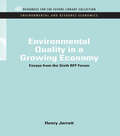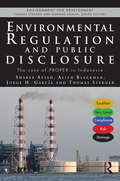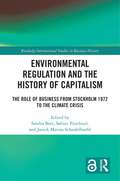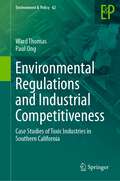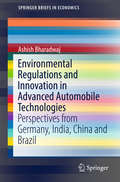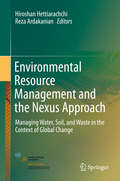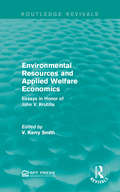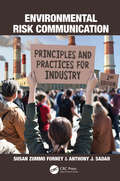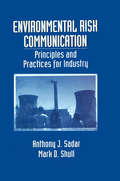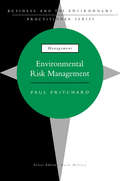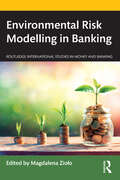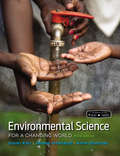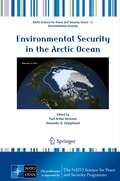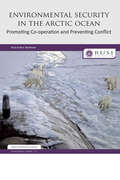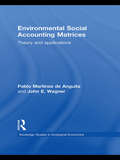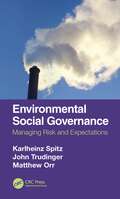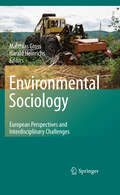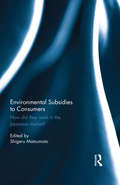- Table View
- List View
Environmental Quality in a Growing Economy: Essays from the Sixth RFF Forum (RFF Environmental and Resource Economics Set)
by Henry JarrettTwelve scholars examine some leading problems in environmental quality, analyze present situations and future prospects, and suggest what might be done about them. Originally published in 1966
Environmental Regulation and Public Disclosure: The Case of PROPER in Indonesia (Environment for Development)
by Allen Blackman Thomas Sterner Shakeb Afsah Jorge H. GarciaThis book is a remarkable case study of an environmental policy initiative for a national environmental regulatory system in the information age. In 1995 the Indonesian Ministry of Environment took the bold step to launch an environmental disclosure initiative called the Program for Pollution Control, Evaluation and Rating (PROPER). Under PROPER, environmental performance of companies is mapped into a five-color grading scale – Gold for excellent, Green for very good, Blue for good, Red for non-compliance, and Black for causing environmental damage. These ratings are then publicly disclosed through a formal press conference and posted on the internet. Not only did this simple rating scheme create a major media buzz and enhanced environmental awareness of the general public, but it also unleashed a wide range of performance incentives that showed how markets with environmental information could function in a developing country setting. The authors provide a multidisciplinary analysis of how the PROPER program harnessed the power of public disclosure to abate the problem of industrial pollution. They describe how the program has successfully improved the average environmental compliance rate from close to thrity per cent in 1995 to as high as seventy per cent in 2011. This improvement was driven primarily by information disclosure, which avoided expensive and unpredictable legal enforcement through the court system of Indonesia. The combination of institutional history and detailed economic and analyses sheds light on the role of policy entrepreneurs who laid the foundation for disclosure and transparency, despite the constraints of the Suharto regime. The PROPER program is now internationally recognized and continues to serve as a model for many developing countries.
Environmental Regulation and the History of Capitalism: The Role of Business from Stockholm 1972 to the Climate Crisis (Routledge International Studies in Business History)
by Sandra Bott Janick Marina Schaufelbuehl Sabine PitteloudThis edited collection examines the historical role of business actors in climate and environmental governance since the 1970s. Through a compilation of recent, evidence-based historical research, this book unveils the origins of contemporary challenges in regulating environmental pollution. With original case studies, it offers a nuanced understanding of the environmental counter-offensive orchestrated by business leaders, associations, and think tanks post-1972, following the United Nations' pivotal Stockholm Conference on the Human Environment. Readers are presented with insights into the historical maneuvers of business entities aimed at mitigating regulatory risks, co-creating expertise, and framing the environmental debate. From revealing the tactics employed by various business actors to exploring the emergence of market-driven environmentalism, this volume offers a comprehensive exploration of the intricate dynamics shaping environmental policy. By contextualizing specificities and complexities, it enriches contemporary narratives on business influence and power dynamics within global capitalism. This book primarily caters to scholars across diverse historical disciplines, including business history, international relations, environmental history, and the history of capitalism. Additionally, it holds relevance for social scientists studying contemporary issues, policymakers grappling with environmental challenges, and those seeking a deeper understanding of the historical dimensions of climate governance.The Open Access version of this book, available at http://www.taylorfrancis.com, has been made available under a Creative Commons Attribution-Non Commercial-No Derivatives (CC BY-NC-ND) 4.0 license.
Environmental Regulations and Industrial Competitiveness: Case Studies of Toxic Industries in Southern California (Environment & Policy #62)
by Ward Thomas Paul OngWhile polluting industries in the U.S. continue to emit billions of pounds of toxic chemicals into the air, land and water every year, many economists and policy makers argue that environmental regulations stifle economic growth and reduce the standard of living for the American people. This book takes a fresh look at this question through three case studies of highly regulated polluting industries in the Southern California region: metal finishing, wood furniture, and dry cleaning. The case studies are based on a mix of qualitative and quantitative methods, including in-depth interviews with corporate managers and environmental regulators. The authors find that there is no universal pattern for predicting the effects of environmental regulations on industrial competitiveness, but that the outcomes depend on the structure of the industry being regulated, the design of the regulations, and the technologies that are available for compliance. The book is written in straight forward language that is accessible to the non-economist and will prove an essential resource for academics and students of all levels, and professionals and policy makers in the fields of environmental policy and regional economic development.
Environmental Regulations and Innovation in Advanced Automobile Technologies: Perspectives From Germany, India, China And Brazil (SpringerBriefs in Economics)
by Ashish BharadwajThe book examines innovation in environment-friendly technologies in the automobile industry. The focus of the book are Germany (a technology leader in the global automobile industry), on the one hand, and India, China and Brazil (technologically proficient emerging technology leaders) on the other hand. Patents have been used as a metric to measure and understand innovation. The book traces the evolution of regulatory standards in the automobile industry, relies on a unique patent dataset, and draws on a number of interviews conducted with regulators and engineers to get a better picture of how environmental policies and standards, including emission norms and fuel requirements, have developed overtime and now the industry has responded. The book’s core argument is that technological innovation is what has driven the industry in the past 125 years, but, at the same time, the industry has created problems and faced controversies with regard to its path dependency on carbon-intensive technologies. As a result, we have witnessed growing role of environmental regulators in ensuring that the growth path of the automobile industry, a powerhouse of growth of several economies, is aligned with the larger goals of addressing climate change and energy concerns. Against the backdrop of the emergence of Brazil, China and India in the global economy, the book focuses on the developments in these three countries, and draws parallels with Germany, which benefited from first mover advantage in technology and a substantial head-start in implementing cogent environmental policies. A standardized International Patent Classification (IPC) system has been used to, first, construct an index of regulatory stringency, based on regulations that came about between 1985 and 2010; and second, construct a unique cross-country weighted patent dataset for technologies invented in the past two and a half decades.
Environmental Resource Management and the Nexus Approach
by Reza Ardakanian Hiroshan HettiarachchiThis book elaborates how water, soil, and waste may be managed in a nexus and how this approach may help combat global change. In addition to providing a brief account on nexus thinking and how it may help us tackle issues important to the world community such as food security, the book presents the environmental resource perspective of three main aspects of global change: climate change, urbanization, and population growth. Taking as its point of departure the thematic discussions of the Dresden Nexus Conference (DNC 2015) held in March 2015, the book presents the perspectives of a number of thought leaders on how the nexus approach could contribute to sustainable environmental resource management. Thefirst chapter provides an introduction to the issues and consent of the book. Chapters 2 and 3 focus on climate change adaptation. Chapters 4 and 5 discussthe role of urbanization as a main driver of global change. The last twochapters of the book present ideas on how the nexus approach may be used tocope with population growth and increased demand for resources.
Environmental Resources and Applied Welfare Economics: Essays in Honor of John V. Krutilla (Routledge Revivals)
by V. Kerry SmithThis book, first published in 1988, provides an overview of the diverse work that was being done in applied and theoretical environmental and resource economics. Some essays reflect upon the background of the work of John Krutilla, one of the founders of Resources for the Future and a leading scholar of environmental economics, and the development of the field to date. Other essays examine and convey findings on particular resource problems and theoretical issues and resource policies and the practice of applied welfare economics. This title will be of interest to students of economics and environmental studies.
Environmental Risk Communication: Principles and Practices for Industry
by Susan Zummo Forney Anthony J. SadarModern industry faces many communication challenges, including social media. The second edition of this book is thoroughly updated, expanded, and reorganized to help industry communicators remain effective in addressing these challenges. At the core of this book are foundational building blocks that address the human factors responsible for driving success or failure when communicating about environmental risk. Features Provides principled guidance for building relationships and engaging in constructive dialogue with stakeholders. Offers straight talk and practical, easy-to-follow guidance on effective risk communication for various situations, stakeholders, and modes of communication. Gives lessons learned from environmental permitting and crisis situations involving risk communication in various industries, including chemical manufacturing, waste management, and the energy sector. Addresses nuanced, recent concerns regarding issues like fake news and social media bullying. Examines the dos and don’ts of communicating effectively during tough conditions like environmental emergencies. Environmental Risk Communication: Principles and Practices for Industry is intended to be both a grounding in enduring principles and a continued resource for best approaches and techniques. Coupled with tools and best practices from decades of experience, this insider’s guide provides CEOs, plant managers, environmental compliance professionals, health and safety officers, and others with the direction and the confidence needed to prepare for difficult dialogue and high-pressure encounters.
Environmental Risk Communication: Principles and Practices for Industry
by Anthony Sadar Mark ShullA public meeting with angry residents and eager reporters is a common feature on the local news. Whether addressing environmental, or other issues, the experience for the board members, consultants, and specialists at these meetings ranges from uncomfortable to nightmarish. The issues discussed in these meetings usually stem from years of community disappointment, mistrust, fears, factions, political or social positioning, or all of the above. Industry faces a labyrinth of environmental and business regulations, and unique challenges in dealing with the public and the media. Environmental Risk Communication serves as a guide to understanding and complying with the Federal Risk Management Program and applying risk management and communication principles to daily plant operations. This book also helps Risk Management Plan (RMP) facilities successfully meet the new Federal requirements for public disclosure of RMP offsite consequence analysis results and provides techniques for communicating effectively during environmental emergencies.Written in a straight-forward, no-nonsense style the book presents concise informative chapters, flow diagrams, checklists, and a thorough index. The authors present step-by-step instruction on developing a principled plan of action that generates open communications. CEOs, Corporate Communications Specialists, Plant Managers, Environmental Compliance Supervisors, Health and Safety Officers, Environmental Scientists and Engineers, and Consultants will benefit from Environmental Risk Communication.
Environmental Risk Management (Business and the Environment Practitioner Series)
by Paul PritchardThis timely publication considers recent developments in environmental risk management as they relate to commercial organizations, including risk transfer through insurance. It starts by looking at characterization of risks based on the hazard-pathway-receptor principles, emphasizing the importance of site specific factors. Environmental risks are increasingly considered as a part of strategic control assessment. Checklists and case studies are presented to assist in review and assessment of environmental risks. Further guidance is offered for decision making under uncertainty, showing the potential of tools such as Monte Carlo analysis and fuzzy logic, and leading to a review of risk assessment and management frameworks. Environmental Risk Management is an accessible and valuable reference to those from a range of backgrounds - including occupational hygiene, safety, quality personnel and operational managers - who are dealing with environmental issues within their organization.
Environmental Risk Management at Chevron Corp.
by Jennifer Burns Forest Reinhardt Monica MandelliChevron Corp., headquartered in San Francisco, manages a worldwide, vertically integrated value chain from the oil well to the gasoline station. Mishandling of oil at any stage of production can damage the natural environment, human health, corporate profitability, or all three. But at the same time Chevron needs to be prudent about the amount of money it spends on measures to manage these risks, and environmental programs within the firm can conflict with a long-standing tradition of decentralized management. To manage risks more efficiently, Chevron executives are contemplating the use of quantitative decision tools that enable operating managers to compute rough benefit-cost ratios for various alternative risk management projects. The case focuses on the pros and cons of using such tools within the context of Chevron's overall system for environmental risk management.
Environmental Risk Modelling in Banking (Routledge International Studies in Money and Banking)
by Magdalena ZiołoEnvironmental risk directly affects the financial stability of banks since they bear the financial consequences of the loss of liquidity of the entities to which they lend and of the financial penalties imposed resulting from the failure to comply with regulations and for actions taken that are harmful to the natural environment. This book explores the impact of environmental risk on the banking sector and analyzes strategies to mitigate this risk with a special emphasis on the role of modelling. It argues that environmental risk modelling allows banks to estimate the patterns and consequences of environmental risk on their operations, and to take measures within the context of asset and liability management to minimize the likelihood of losses. An important role here is played by the environmental risk modelling methodology as well as the software and mathematical and econometric models used. It examines banks’ responses to macroprudential risk, particularly from the point of view of their adaptation strategies; the mechanisms of its spread; risk management and modelling; and sustainable business models. It introduces the basic concepts, definitions, and regulations concerning this type of risk, within the context of its influence on the banking industry. The book is primarily based on a quantitative and qualitative approach and proposes the delivery of a new methodology of environmental risk management and modelling in the banking sector. As such, it will appeal to researchers, scholars, and students of environmental economics, finance and banking, sociology, law, and political sciences.
Environmental Scenario in India: Successes and Predicaments
by Debashis Chakraborty Sacchidananda MukherjeeIndia has moved along an impressive growth path over the last decade, marked with falling share of agriculture, stagnating manufacturing, expanding services segment, growing trade orientation, enhanced FDI inflows etc. The consequent growth implications are obvious as far as the numbers like GDP growth rate and Per Capita GDP trend are concerned, but how sustainable the associated development is with respect to resource management and environmental governance? This book captures the economy-wide impacts of various activities on environment in India. The environmental impacts on water, air, soil quality and human health are captured through case studies from different parts of India. Analyzing separately the concern areas within agriculture (cultivation, aquaculture), manufacturing (industrial pollution, power generation), services (waste management, bio-medical waste, e-waste recycling) and external sector (agricultural trade, FDI inflow, trade in waste products) performance of India, the book attempts to find an answer to that crucial question. The methodology adopted to capture the environmental impacts of various economic activities is derived from the relevant branches like environmental economics, agricultural economics, and water resources economics. The book, focusing on particular sectors, indicates the concern areas and possible ways for enhancing environmental governance.
Environmental Science
by Anne Houtman Susan Karr Jeneen InterlandiFollowing real people and real science, Environmental Science for a Changing World provides a unique context for showing students how science works and how to think critically about environmental issues. Chapters don't merely include interesting stories--each chapter is an example of science journalism at its best, combining Scientific American-style writing, layout, and graphics to tell one compelling story that exemplifies important concepts and issues. This approach has proven so effective, that instructors using the book report a dramatic increase in the number of students who read the assignments and come to class ready to participate. This updated new edition features new stories, updated scientific coverage, and enhanced Infographics--the book's signature visual study tool that combines memorable images, step-by-step callouts, and now, questions that foster scientific literacy.
Environmental Science & Protection: Keeping Our Planet Green
by Cordelia StrangeGlobal warming, water and air pollution, and the loss of ecosystems are just a few of the environmental issues facing us today. The good news is there are actions we can take to prevent further issues, and hopefully even to correct some of the negative effects. There are even people who choose a career in environmental science and devote their lives to studying and trying to fix environmental issues--could you be one of them? The young adults of today will be the job force of tomorrow, so choosing a career that will best fit with the needs of the changing world will be important to job satisfaction and a successful life. With the vast array of career and job options, it will also be important for young adults to understand which work will be the best match for their interests, talents, goals, and personality types. Certain careers are expected to gain importance within the early decades of the twenty-first century. According to the United States Bureau of Labor Statistics, the number of jobs for environmental scientists and specialists is expected to grow much faster than the average rate for all occupations. The environmental issues facing the planet today affect everyone in the world. If you choose a career in environmental science, you would be a part of making the planet a healthier place for future generations. You could help save the world--and that's not a bad day's work!
Environmental Science For a Changing World (Third Edition)
by Anne Houtman Susan Karr Jeneen Interlandi<P>Following real people and real science, Environmental Science for a Changing World provides a unique context for showing students how science works and how to think critically about environmental issues. Chapters don’t merely include interesting stories they are examples of science journalism at its best, combining Scientific American-style writing, layout, and graphics to tell compelling stories that exemplify important concepts and issues. This approach has proven so effective that instructors using the book report a dramatic increase in the number of students who read the assignments and come to class ready to participate. <P>This updated new edition features new stories, updated scientific coverage, and enhanced Infographics—the book’s signature visual study tool that combines memorable images, step-by-step callouts, and questions that foster scientific literacy. The book is organized into 11 chapters, each consisting of multiple modules focused on different aspects of environmental science, from ecology and evolution, to human interactions with the environment, to land, water, and energy resources. Although each module tells a compelling and relatable story, it is built on a core pedagogy of Guiding Questions that help students extract the scientific concepts that form the basis for the story.
Environmental Science: Earth as a Living Planet (3rd edition)
by Daniel B. Botkin Edward A. KellerAn introductory textbook that presents the most important concepts in the study of the environment from an analytical and interdisciplinary perspective, and encourages students to formulate their own thoughts about environmental problems. Annotation C. by Book News, Inc., Portland, Or.
Environmental Security in the Arctic Ocean
by Paul Arthur Berkman Alexander N. VylegzhaninThis seminal book results from a NATO Advanced Research Workshop at the University of Cambridge with Russian co-directorship, enabling the first formal dialogue between NATO and Russia about security issues in the Arctic Ocean. Involving interdisciplinary participation with experts from 17 nations, including all of the Arctic states, this workshop itself reflects progress in Arctic cooperation and collaboration. Interests now are awakening globally to take advantage of extensive energy, shipping, fishing and tourism opportunities in the Arctic Ocean as it is being transformed from a permanent sea-ice cap to a seasonally ice-free sea. This environmental state-change is introducing inherent risks of political, economic and cultural instabilities that are centralized among the Arctic states and indigenous peoples with repercussions globally. Responding with urgency, environmental security is presented as an "integrated approach for assessing and responding to the risks as well as the opportunities generated by an environmental state-change." In this book - diverse perspectives on environmental security in the Arctic Ocean are shared in chapters from high-level diplomats, parliamentarians and government officials of Arctic and non-Arctic states; leaders of Arctic indigenous peoples organizations; international law advisors from Arctic states as well as the United Nations; directors of inter-governmental organizations and non-governmental organizations; managers of multi-national corporations; political scientists, historians and economists; along with Earth system scientists and oceanographers. Building on the "common arctic issues" of "sustainable development and environmental protection" established by the Arctic Council - environmental security offers an holistic approach to assess opportunities and risks as well as develop infrastructure responses with law of the sea as the key "international legal framework" to "promote the peaceful uses" of the Arctic Ocean. With vision for future generations, environmental security is a path to balance national interests and common interests in the Arctic Ocean for the lasting benefit of all.
Environmental Security in the Arctic Ocean: Promoting Co-operation and Preventing Conflict (Whitehall Papers)
by Paul Arthur BerkmanThe North Pole is being transformed from a sea-ice cap to a seasonally ice-free sea within the next few decades. This fundamental shift in the boundary conditions of the Arctic Ocean will create a new natural system with different dynamics than anything previously experienced by humans in the region. With the diminishing ice cover, interests are awakening globally to take advantage of extensive energy, shipping, fishing and tourism prospects in the Arctic Ocean. A range of states, including the major Arctic powers, are increasingly asserting their sovereignty seawards. National security policies are being declared and nuclear-capable states are adjusting their strategic deployments in the Arctic Ocean. There are forums for international cooperation in the Arctic, most notably the Arctic Council, but peace in the Arctic Ocean has yet to be explicitly established as a common interest because of the long-standing military presence. Risks of political, economic and cultural instabilities are inherent consequences. This volume proposes environmental security as providing a holistic framework to assess these security risks and then identify the appropriate adaptation and mitigation responses. Only after shared risk assessment and understanding of the appropriate responses, will there be sufficient clarity about the governance paths to pursue within the international legal framework of the law of the sea.
Environmental Social Accounting Matrices: Theory and Applications (Routledge Studies in Ecological Economics #7)
by John E. Wagner Pablo Martínez de AnguitaIn this book Professors Pablo Martínez de Anguita and John E. Wagner put two disciplines together, regional and ecological economics, presenting a way to understand ecological economic concerns from a regional perspective, and providing a mathematical tool to measure their interrelationships. This book offers different regional economic models that explicitly include the role of the natural resources and pollutants in economic regions through the use of Social Accounting Matrixes and Input-output models. The main objective of this book is to explore Input-output and Social Accounting Matrix (SAM) models by expanding the accounts to include natural resources and the environment. The proposed models in this book incorporate the forest and other natural resources and pollutants as a component in a larger model of how the economy and environment of larger areas interact. This book will be of interests to postgraduates, researchers and scientists in the fields of regional, resource, environmental, or ecological economics.
Environmental Social Governance: Managing Risk and Expectations
by Karlheinz Spitz John Trudinger Matthew OrrIncreasingly, companies are being judged by their performance in terms of Environmental Social Governance (ESG). But exactly what does it mean, and what should be done about it? While much ambiguity exists, it is no longer sufficient to negotiate the environmental assessment process successfully. ESG is an ongoing process that spans the entire life cycle of a company and its operations. This book is aimed at business leaders – senior executives and company directors – and particularly those involved in the extractive industries and other ventures that significantly affect the environment and host communities. Guidance is provided on the major ESG issues that confront all business leaders. Strategies are provided to address ESG risk and to handle crises when they occur. QUESTIONS FOR BUSINESS LEADERS: Are you at all prepared for an environmental or social crisis event? How will you cope with the "unknown unknowns"? What do your shareholders expect you to do about climate change? Are your employees proud of the company’s ESG performance? How does your bank evaluate your biodiversity impacts?
Environmental Sociology
by Harald Heinrichs Matthias GroßDespite being a relatively young sub-discipline, European environmental sociology has changed considerably in the last decades towards more interdisciplinary collaborations and problem solving. Current trends such as global environmental modernization and processes of economic, political and socio-cultural globalization, fuelled by developments of transport, environmental flows, scientific uncertainty, and information technologies, have fostered new conceptual approaches that move beyond classical sociological mind-sets toward broader attempts to connect to other disciplines.
Environmental Subsidies to Consumers: How did they work in the Japanese market?
by Shigeru MatsumotoA typical consumer underestimates the benefits of future energy savings and underinvests in energy efficiency, relative to a description of the socially optimal level of energy efficiency. To alleviate this energy-efficiency gap problem, various programs have been implemented. In recent years, many governments have started providing consumers with subsidies on the purchases of eco-friendly products such as hybrid cars and energy efficient appliances. This book conducts a comprehensive analysis of the environmental subsidy programs conducted in Japan and examines their impacts on consumer product selection, consumer product use, and environmental outcome. The book also proposes recommendations for future environmental and industrial policies. The book's empirical findings will be of interest to those who are researching on and policymakers of environmental and industrial policies.
Environmental Sustainability
by P. Thangavel G. SrideviCovers different categories of green technologies (e. g. biofuels, renewable energy sources, phytoremediation etc. ,) in a nutshell -Focuses on next generation technologies which will help to attain the sustainable development -The chapters widely cover for students, faculties and researchers in the scientific arena of Environmentalists, Agriculturalists, Engineers and Policy Makers The World Environment Day 2012 is prepared to embrace green economy. The theme for 2012 encompasses various aspects of human living, ranging from transport to energy to food to sustainable livelihood. Green technology, an eco-friendly clean technology contributes to sustainable development to conserve the natural resources and environment which will meet the demands of the present and future generations. The proposed book mainly focuses on renewable energy sources, organic farming practices, phyto/bioremediation of contaminants, biofuels, green buildings and green chemistry. All of these eco-friendly technologies will help to reduce the amount of waste and pollution and enhance the nation's economic growth in a sustainable manner. This book is aimed to provide an integrated approach to sustainable environment and it will be of interest not only to environmentalists but also to agriculturists, soil scientists and bridge the gap between the scientists and policy-makers.
Environmental Sustainability in Asian Logistics and Supply Chains
by Xiaohong LiuThis book gathers together invited presentations from the 12th International Congress on Logistics and SCM Systems (ICLS2017) held in Beijing, China, August 20–23, 2017. The focus of the ICLS2017 was environmental sustainability in logistics and supply chains, particularly in the Asia-Pacific region. It addressed a variety of themes in the domains of green logistics and supply chain management (SCM), including green logistics and environmental impact, green SCM and business performance, green operations and optimization, supply chain sustainability, carbon management in logistics, and green SCM and corporate social responsibility (CSR). The editors selected high-quality presentations from the highly successful symposium, and invited the presenters to prepare full chapters for this book in order to disseminate their findings and promote further research collaborations. This timely book sheds new light on the theories and practices associated with greening logistics and SCM in Asia.
